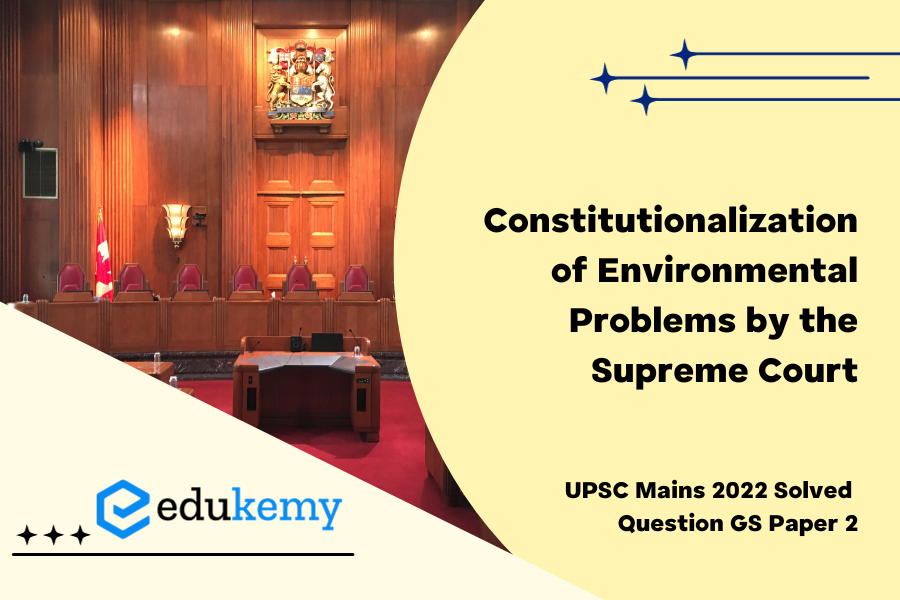UPSC Mains General Studies Paper – 2 Mains 2022
UPSC Mains Civil Services IAS Exam Question Paper – 2022
Contents
Approach
Introduction: Briefly write down the journey of environmental governance in India.
Body:
- Extensively write down the achievements of the Supreme Court in constitutionalization of environmental problems by quoting important environmental cases.
- Also write about the legal doctrines adopted and developed by the Supreme Court and how SC judgements expanded the scope of environmental governance.
Conclusion: Briefly write down the concerns associated with recent Supreme Court judgments and need to establish environmental rule of law
Answer
Introduction
“What of thee I dig out, let that quickly grow over. Let me not hit thy vitals or thy heart. ”MS. Indira Gandhi concluded her Stockholm Conference speech by quoting this hymn from Atharva Veda to outline the need for maintaining ecological balance. The success of the Supreme Court in the constitutionalization of environmental problems can be very much attributed to the efforts of MS Gandhi to constitutionalize the subject of environmental governance by adding Article 48(A) and 51-A (g) in the Constitution through the 42nd Constitutional Amendment in 1976.
Body
- Constitutionalization of Environmental problems: Decoding the Journey of the most significant achievement of modern law in India.
- Doctrine Of Absolute Liability: In M C Mehta vs Union of India case, Supreme Court introduced the doctrine of absolute liability which makes hazardous industries absolutely liable for the harm resulting from its activities.
- Polluter Pays Principles: In Vellore Citizen’s Welfare Forum v. Union of India case, the Supreme Court upheld the polluter pays principle which aims to repair the harm or damage done to the natural environment.
- Public Trust Doctrine: In M.C. Mehta v. Kamal Nath case, Hon’ble Court held that certain resources like air, water, sea and the forests have such a great importance to people as a whole that it would be wholly unjustified to make them a subject of private ownership.
- Right to a wholesome environment: In Subhash Kumar v. State of Bihar case, the Supreme Court laid down an expansive interpretation of the word “life” in Article 21 by including environmental protection in Right to Life.
- Fundamental right to water: In Narmada Bachao Andolan vs Union of India case, the Supreme Court of India upheld that “Water is the basic need for the survival of human beings and is part of the right to life and human rights as enshrined in Article 21 of the Constitution of India.
- Species best interest standard: In Centre for Environmental Law vs Union of India case, Supreme Court upheld this standard while declaring the nation’s right to have a second habitat for lions.
- Biocentric basis of law: In M.K. Ranjitsinh case, Supreme Court’ upheld the biocentric principles of coexistence by directing the governments of Rajasthan and Gujarat to take steps to install bird diverters pending consideration of the conversion of overhead cables into underground power lines.
Conclusion
Despite all the achievements, recent judgements of the Supreme Court in Pahwa Plastics Pvt. Ltd. and Electrosteel Steels Ltd. by invoking Ing of Doctrine of Proportionality have reflected a fundamental shift in the SC approach towards environmental issues. Time has come for the Supreme Court to take the “eccentric approach” in place of the “anthropocentric approach” in judicial reasoning to realize the goal of environmental rule of law.
In case you still have your doubts, contact us on 8792740517.
For UPSC Prelims Resources, Click here
For Daily Updates and Study Material:
Join our Telegram Channel – Edukemy for IAS
- 1. Learn through Videos – here
- 2. Be Exam Ready by Practicing Daily MCQs – here
- 3. Daily Newsletter – Get all your Current Affairs Covered – here
- 4. Mains Answer Writing Practice – here


